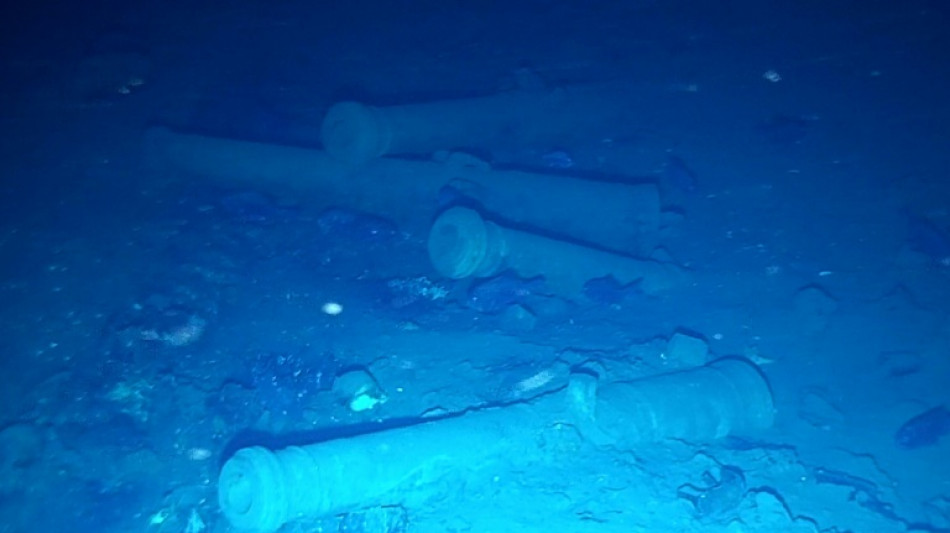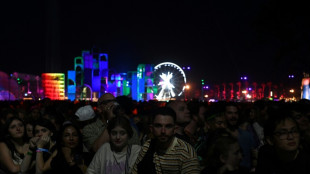
| RBGPF | -0.84% | 59.69 | $ | |
| RYCEF | 0.59% | 6.83 | $ | |
| CMSC | 0.13% | 24.672 | $ | |
| BCC | 2.21% | 143.53 | $ | |
| SCS | 1.4% | 13.225 | $ | |
| RELX | 2.16% | 46.77 | $ | |
| GSK | 0.81% | 33.975 | $ | |
| AZN | 2.03% | 65.59 | $ | |
| RIO | -0.55% | 62.23 | $ | |
| JRI | 0.18% | 13.254 | $ | |
| NGG | 1.72% | 63.165 | $ | |
| VOD | 1.4% | 8.72 | $ | |
| CMSD | 0.21% | 24.497 | $ | |
| BTI | 0.98% | 37.345 | $ | |
| BCE | 0.13% | 26.715 | $ | |
| BP | 0.59% | 29.695 | $ |

New finds in treasure-laden shipwreck off Colombia
New artifacts have been found on the legendary Spanish galleon San Jose, Colombia's government announced Thursday, after the first robotic exploration of the three-century-old shipwreck.
In February, the Colombian government announced it would begin extractions from the ship off its Caribbean coast, with the wreckage believed to be holding treasures worth billions of dollars.
"Results of this exploration have revealed an unprecedented set of archaeological evidence, which has greatly expanded our knowledge," the institutions in charge of exploring the wreck said in a statement.
It said a robot surveyed the wreck, whose exact location has been kept secret since its discovery in 2015, between May 23 and June 1.
"Although a concentration of archaeological remains was detected in 2022 in the area of the shipwreck, the recent exploration has allowed to characterize these accumulations in more detail and to discover new isolated elements," the statement said.
Among the new artifacts are an anchor, as well as part of the ship's cargo such as jugs and glass bottles. Four observation campaigns were carried out in 2022 by the Colombian Navy with high-tech equipment to verify the condition of the wreck.
The images reported had shown, among other things, cast iron cannons, porcelain pieces, pottery and objects apparently made of gold.
"We believe that it is possible to find new remains that would deepen the information we have so far," said Alhena Caicedo, director of the Colombian Institute of Anthropology and History, quoted in the statement.
The San Jose was owned by the Spanish crown when it was sunk by the British navy near Cartagena in 1708. Only a handful of its 600-strong crew survived.
Colombia's government believes that this first exploration "raises questions about the exact causes of the sinking."
British documents state that the ship suffered an "internal explosion," which would have caused it to sink with its treasure and hundreds of passengers, according to Colombia's government. Spanish reports however point to a battle.
The ship had been heading back from the New World to the court of King Philip V of Spain, laden with treasures such as chests of emeralds and some 200 tons of gold coins.
Before Colombia announced the discovery in 2015, the ship had long been sought by adventurers.
Spain had laid claim to the ship and its contents under a UN convention Colombia is not party to, while Indigenous Qhara Qhara Bolivians claim the riches were stolen from them.
But Petro's government has insisted on raising the wreck for purposes of science and culture, with the project estimated to cost some $4.5 million.
The wreck is also claimed by US-based salvage company Sea Search Armada -- which insists it found it first more than 40 years ago and has taken Colombia to the UN's Permanent Court of Arbitration, seeking $10 billion dollars.
J.Fletcher--NG


